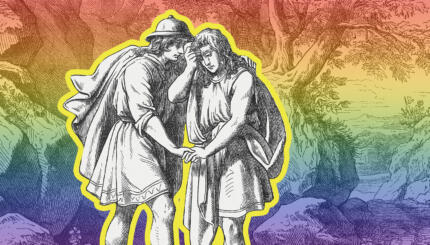While the legal basis is different from that of copyright law in most modern nations, Jewish law developed its own mechanism for preventing others from republishing someone else’s work. Unlike Rabbi Mordechai Bennet’s ruling, cited in this article, copyright protection explicitly prevents others from copying–without reference to whether the publisher (or author) has sold out his first edition, recouped his investment, or decided to discontinue further printing and selling (even if this hinders “the work of Heaven.”) The author of this article refers to print publications and videocassette tapes, but rabbinic authorities have applied the principles of his argument to other media as well, including computer software.Reprinted with permission from The Challenge of Wealth: A Jewish Perspective on Earning and Spending Money (Jason Aronson).
The advent of printing created a new Jewish industry, the writing and publishing of books for a mass market. With increased standards of living, this has become even more pronounced in our present society, together with the proliferation of radio and video cassettes. In all its forms, the publishing industry means an increased supply of knowledge that is to the public benefit. Judaism’s insistence on
study, not merely as something desirable or important, but as a perpetual religious obligation on every Jew, irrespective of his age, education, or economic status, makes the use of this increased supply of knowledge an essential ingredient of Jewish life.
Unlimited competition would increase this supply and lower its costs, thus making extensive Jewish education possible and so contributing to the public welfare. On the other hand, authors would be fearful of writing. Entrepreneurs, moreover, would be wary of investing in publishing or marketing of books and cassettes, in fear of not being able to recoup their investment, including their profits, owing to fierce competition. So the custom of haskamot, rabbinical decrees forbidding competitors from republishing books without the consent of the author and the publisher, became common. This has been extended by present-day authorities to include tapes and cassettes.
In addition, communal enactments also limiting competition were legislated by the various Jewish councils. At the same time, however, by and large, care was taken to limit the monopoly status of the possessor of the intangible asset, so as to prevent the community suffering from restricted supply or higher prices as the result of this status. One example of the conflict between these two principles of public welfare may be seen in the two opinions quoted in one of the commentators of the Shulchan Arukh, the Pitchei Teshuvah [the central European 19th-century Rabbi Tzvi Hirsch Eisenstadt].
Rabbi Mordechai Bennet [an early 19th-century Moravian rabbi], rules that “the haskamah (approval) given by the great scholars to publishers, preventing others from reprinting their books, is definitely binding, even though it is not verbal [the usual prerequisite for a valid oath]. However [although the haskamah was given for a limited period] when the publisher has already sold the entire edition [and recouped his investment and his profit] he may not prevent others from reprinting the book and thus hinder their work of Heaven [by preventing the spread of Torah learning]. This is true, even if the period for which the original ban was given has not yet ended, since he is not losing anything [to prevent this would have resulted in abnormal monopoly profit].”

Help us keep Jewish knowledge accessible to millions of people around the world.
Your donation to My Jewish Learning fuels endless journeys of Jewish discovery. With your help, My Jewish Learning can continue to provide nonstop opportunities for learning, connection and growth.
[The early 19th-century Polish] Rabbi Zalman Margolis,however, opposes this. He holds that even if the publisher has sold his entire original edition, the ban is valid until the period for which it was given expires [thus giving him the extra profits from a second or perhaps even a third edition].” (Pitchei Teshuvah to Shulchan Arukh, Yoreh De‘ah 236:1)


